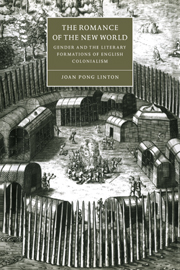Book contents
- Frontmatter
- Contents
- Acknowledgments
- Introduction
- 1 Love's laborers: the busy heroes of romance and empire
- 2 Sea-knights and royal virgins: American gold and its discontents in Lodge's A Margarite of America (1596)
- 3 Jack of Newbery and Drake in California: domestic and colonial narratives of English cloth and manhood
- 4 Eros and science: the discourses of magical consumerism
- 5 Gender, savagery, tobacco: marketplaces for consumption
- 6 Inconstancy: coming to Indians through Troilus and Cressida
- 7 The Tempest, “rape,” the art and smart of Virginian husbandry
- Coda: the masks of Pocahontas
- Notes
- Works cited
- Index
- Cambridge Studies in Renaissance Literature and Culture
4 - Eros and science: the discourses of magical consumerism
Published online by Cambridge University Press: 06 November 2009
- Frontmatter
- Contents
- Acknowledgments
- Introduction
- 1 Love's laborers: the busy heroes of romance and empire
- 2 Sea-knights and royal virgins: American gold and its discontents in Lodge's A Margarite of America (1596)
- 3 Jack of Newbery and Drake in California: domestic and colonial narratives of English cloth and manhood
- 4 Eros and science: the discourses of magical consumerism
- 5 Gender, savagery, tobacco: marketplaces for consumption
- 6 Inconstancy: coming to Indians through Troilus and Cressida
- 7 The Tempest, “rape,” the art and smart of Virginian husbandry
- Coda: the masks of Pocahontas
- Notes
- Works cited
- Index
- Cambridge Studies in Renaissance Literature and Culture
Summary
The sixteenth century saw a developing anxiety in England about the domestic consumption of foreign trifles or fashion goods. Although writers in this period do not use the term “consumer,” they do have a definite and often negative view of consumption in the sense of using up valuable resources. This view of consumption is based on two assumptions of what historians call the Tudor moral conception of economy. The first is that a nation's resources are limited, so that consumption of non-essential goods will inevitably exhaust the stock of daily necessities. Hence the division between basic necessities or commodities, and fashion goods or trifles, toys, baubles, fancies, and vanities, etc., a division which moralizes economic values. The second assumption equates production with the increase of personal and national wealth, and consumption with its depletion. Specifically in the context of international trade, production is linked with a trade surplus and consumption with a trade deficit. Since England's trade balance with other nations is at stake, it is no surprise that the anxiety regarding domestic consumerism finds its target in foreign trifles.
Thus while moral writers condemn consumers for their pride and idolatry in worshiping their own image before God's, economic writers point to the drain on personal and national wealth when foreign merchants buy cheap English raw materials with which to fashion trifles, and then resell these items at a profit to gullible English consumers. As Jeffrey Knapp has shown, colonial advocates, in addressing these complaints, offer the prospect of commerce in America, where the English can play the role of “clever merchants” selling worthless trifles to Indians.
- Type
- Chapter
- Information
- The Romance of the New WorldGender and the Literary Formations of English Colonialism, pp. 84 - 103Publisher: Cambridge University PressPrint publication year: 1998

